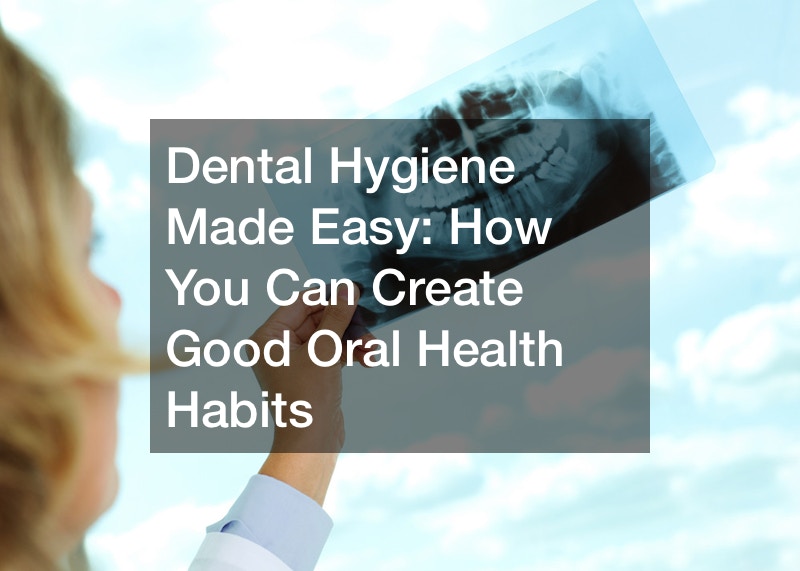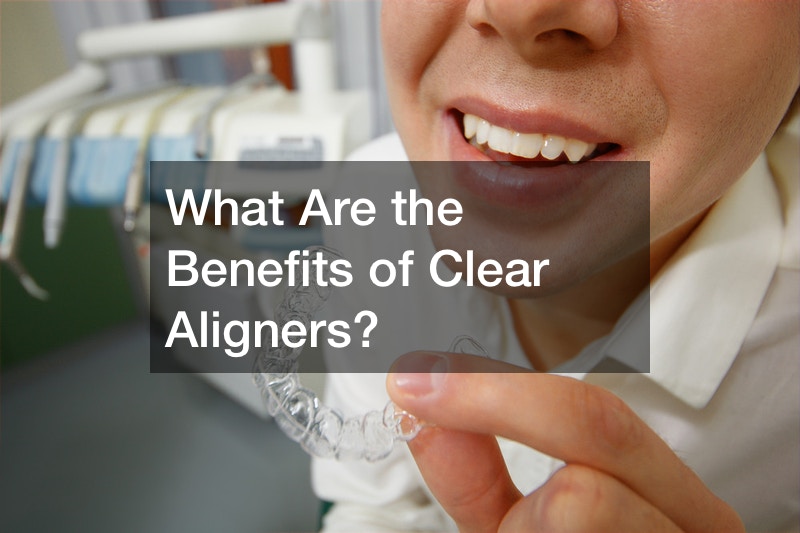
Dental Hygiene Made Easy How You Can Create Good Oral Health Habits

Taking care of your teeth starts at a young age and true, while baby teeth fall out and a secondary or permanent set grows in, the milk teeth form the foundation for the final set. There are many different types of dental cleanings to assist with removing plaque buildup and tartar.
You will notice the difference with your teeth before and after cleaning, and it helps to maintain their health and reduce the chances of cavities. Cosmetic teeth cleaning may also be completed by your local dentist, and you can check whether the practice does this or not. Have you been Googling, where can I get my teeth cleaned without exam? Indeed, teeth can be intricate and sometimes you may only want a clean to save money. Check with your dentist is this is possible with them.

Furthermore, to help maintain good oral hygiene, simply brush twice a day, and avoid sweet sugary foods like pastries, chocolate, and so forth. Changing your toothbrush every three months will also greatly help improve the health of your pearlies.
Last but not least, find a dentist that you can visit as your reliable medical professional and visit them at their dental offices at least once a year. However, ideally, it should be twice a year. Trust dentists to help you keep your teeth healthy.

Proper oral hygiene is crucial not only for healthy teeth and gums but also for overall well-being. This is because your mouth is the door to your digestive and respiratory tracts. Therefore, adopting good oral habits, such as brushing your teeth, is essential to protect your oral health. And it’s never too late to start caring for your oral health. If you’re wondering where to start, our dental hygiene made easy guide is worth your time.
What is Good Oral Health?
If your mouth looks and smells healthy, you have good oral health. This means you can keep your smile even when in a crowd. And in addition to looking and feeling good, healthy teeth allow you to eat and speak properly. Good oral health means your teeth are clean and free from debris. Also, if your gums are pink and don’t bleed or hurt when you floss or brush, you have good oral health.
How to Maintain Good Oral Health

If you’ve been struggling to keep your teeth and gums healthy, our dental hygiene made easy guide is what you need. You must understand that maintaining good oral hygiene isn’t a one-time activity—it should be routine. Below are some ways to keep your teeth and gums healthy.
Brush Your Teeth
Good oral health starts with keeping your teeth and mouth clean. Experts recommend brushing your teeth twice daily—it’s a general oral hygiene practice to get rid of plaque and bacteria and keep your teeth clean. Still, some people neglect this essential oral hygiene practice or do it incorrectly.
How you brush your teeth matters a lot. There are particular techniques to follow when cleaning your teeth. First, you should know when to brush your teeth. Ideally, this should be done before going to bed and on one other occasion daily. Also, you should use fluoride toothpaste because it effectively prevents tooth decay.
Depending on your preference, you can use an electric or manual toothbrush; both are equally good. Either way, ensure you use a soft-bristled toothbrush—medium or hard bristles can harm your tooth enamel and guns.
When brushing your teeth, ensure you reach the front, top, and back of every tooth. Also, you should brush your teeth in small circular motions. Avoid sawing back-and-forth motions, as many people do. The whole process of brushing your teeth should take at least two minutes. After brushing your teeth, gently brush your tongue to get rid of bacteria and freshen your breath. Remember to change your toothbrush when the ends look frayed or every three months, whichever comes first.
Floss Your Teeth

Flossing daily between the teeth helps remove dental plaque. It’s a ‘dental hygiene made easy’ recommendation that many people neglect. Flossing removes the little pieces of food stuck in between your teeth. It’s excellent practice, especially for those who love eating steak and other foods that stick between their teeth.
So, after having a good time at a steak restaurant, brush your teeth to remove the remains. Also, flossing stimulates the gums and helps lower inflammation in the area. And it doesn’t matter when you floss, as long as you do it thoroughly and make it a daily habit.
We recommend using dental floss or dental tape to floss your teeth. Your dentist can advise you on whichever is best for you. It’s essential to maintain a regular pattern when flossing. This way, you won’t miss any teeth.
Avoid Sugary Foods and Drinks
Sugary foods are not good for your oral health. Consuming a lot of sugar may cause cavities. Some staple American Chinese dishes like sweet and sour chicken, orange chicken, and General Tso chicken are high in sugar thanks to syrup sauces. So, if you love eating at a Chinese restaurant, be mindful of your food choices.
A slice of pizza, a famous and best Italian food, has about five grams of sugar. So, if you consume about four pieces daily, you’ll have added 20 grams of sugar to your body. And this is harmful to your oral health.
According to the World Health Organization (WHO), adults and children should minimize their daily intake of free sugars to less than 10% of their energy intake. This is because sugar turns into acid in the mouth, eroding your teeth’s enamel and ultimately causing cavities. Acid fruits, coffee, and teas can also wear down tooth enamel. However, you don’t have to avoid sugary foods altogether. Instead, be mindful of the amounts you consume.
Starchy foods like bread and pasta have also been linked to tooth decay. These foods stay in the mouth and break down into simple sugars. Acid-producing bacteria then feed on these simple sugars and can cause tooth decay.
Avoid Smoking

According to the Centers for Disease Control and Prevention (CDC), smokers have twice the risk of gum disease than non-smokers. Your risk of gum disease increases with the number of cigarettes you smoke. Also, if you continue to smoke for an extended period, your risk of gum disease will be much higher. Worse, a revitalizing treatment for gum disease may be less effective on someone who smokes.
Therefore, you should quit smoking to maintain good oral health and prevent related issues. It is one of the basic ‘dental hygiene made easy’ practices that can be difficult for addicted smokers. If you don’t smoke, don’t even think of starting. This also applies to using any tobacco product—they are all harmful to oral health.
Visit Your Dentist Regularly
Many people only visit dentists whenever they have a problem with their teeth. But this should not be the case. Ideally, you should visit a dentist at least twice yearly, even when you believe your oral health is good. Regular dentist visits are a ‘dental hygiene made easy’ technique many people ignore. However, many people avoid dental visits due to dental anxiety and fear. But here are some benefits of regular dentist visits;
Education on Proper Dental Hygiene
You might have read many dental hygiene made easy guides and feel confident about your dental hygiene practices. But believe it or not, you still need proper guidance from a professional on how to handle your dental hygiene. A dentist will teach you how to brush and floss your teeth correctly and offer dental hygiene tips to help maintain oral health.
Prevent Future Oral Health Issues
Don’t wait until you have tooth decay or damaged enamel to book an appointment with a dentist. You can prevent some of these issues by visiting your dentist regularly. Your dentist can easily detect concerns that could lead to significant issues. Also, they’ll provide treatment to prevent major issues with your oral health.
Consultation About Teeth Whitening

If you’re thinking of bleaching your teeth to make them lighter (teeth whitening), perhaps you should consult your dentist. While the practice has recently gained popularity, many myths surround it. Your dentist will advise you about the practice.
Remember, you might have to pay for the services when you visit a dentist. However, some dental insurance policies cover frequent dental checkups. Therefore, if your insurance provider pays for regular dental visits, take advantage of it. It’s part of the ‘dental hygiene made easy’ strategies to enhance your oral health.
Effects of Poor Oral Health
Poor oral hygiene affects not only your oral health but also your overall physical well-being. You may develop issues due to not brushing your teeth or overeating sugary foods. According to the WHO, oral diseases affect approximately 3.5 billion people. So, if you’re not taking good care of your oral health, you could develop the following problems;
Tooth Decay (Dental Caries)
When dental plaque builds up on your teeth, it converts the free sugars in the foods you consume into acids that destroy your teeth, leading to tooth decay. Cavities, also known as tooth decay or dental caries, stem from bacteria in your mouth, not cleaning your teeth well, and frequent snacking and sipping of sugary drinks.
Although tooth decay is common in children, it can happen at any age. You won’t feel pain or symptoms of tooth decay on the outer enamel surface. However, if the cavity goes beyond the enamel into the pulp and dentin, you’re experiencing certain symptoms, including bad breath, bleeding gums, facial swelling, toothache, and tooth sensitivity. Regular dental checkups can help you prevent tooth decay early before they grow larger.
Periodontal (Gum) Disease
Periodontal or gum disease affects the tissues that surround and support the teeth. The disease mainly stems from infections and inflammation of the bone and gums that surround the teeth. The early stage of periodontal disease is known as gingivitis, where your gums become swollen and red and sometimes bleed.
Periodontitis is a severe form of gum disease characterized by gums pulling away from the tooth. Your teeth may loosen or, worse, fall out. Periodontal disease is among the biggest threats to dental health, mainly affecting adults. According to research by the CDC, around 47.2% of adults aged 30 and older have some form of periodontal disease. Moreover, the risk of getting the disease increases with age.
Symptoms of periodontal disease include;
- Bad breath
- Tender or bleeding gums
- Sensitive teeth
- Painful chewing
- Red or swollen gums
- Gums that have pulled away from teeth
Oral Cancer
The WHO ranks oral cancer as the 13
th most common cancer worldwide. It includes cancers of the lips, oropharynx, tongue, and other parts of the mouth. Symptoms include loose teeth, mouth and ear pain, lip or mouth soreness, and a growth or lump inside your mouth. Some factors that increase the risk of oral cancer include heavy alcohol consumption, tobacco use, and a weakened immune system. But with our dental hygiene made easy guide, you’ll prevent oral cancer.
Different Oral surgeries
If you have a problem with your oral health, your dentist may recommend oral surgery to address the problem. There are various oral surgeries depending on your problem. Your dentist will diagnose your condition before recommending the best treatment. Moreover, oral surgeries are performed at various dental practices.
If you have a fear of dental surgeries, a sedation dentist will ensure you don’t feel any pain or fear during the procedures. Here are common oral dental surgeries;
Dental Implant Installation
If you have missing teeth, your dentist may recommend dental implant installation to replace the teeth. The procedure involves inserting a screw or rod into your jaw. Also, your dentist may attach a crown to the implant. However, this will depend on the type of implant used and your jaw’s health.
Tooth Extraction
This is perhaps the most common oral surgery worldwide. Your dentist may recommend tooth extraction (tooth removal) if you have severe tooth decay, dental trauma, gum disease, or wisdom teeth complications. Sometimes, tooth extractions are done to prepare you for dentures or other prosthetic devices. Mostly, tooth extractions are a preventive measure to minimize the risk of bone loss, cavities, and other related problems.
Periodontal Surgery
Your dentist may recommend this surgery if you have severe periodontitis. The dental specialist will make incisions along your gum line and move the tissue away from your teeth. They’ll then flush away bacteria and plaque under your gums before repositioning and suturing the gum tissue.
Corrective Jaw Surgery
If you have skeletal abnormalities in your jawbones, you may need corrective jaw surgery (orthognathic surgery) to correct the issue. The procedure enhances chewing function, addresses facial imbalances, and corrects misalignment.
Dental Bone Graft
A dental bone graft may be recommended when you experience bone loss in your jaw. The surgery restores volume and density in your jawbone, giving room for dental implants. A bone graft also minimizes mobility and offers a solid foundation, keeping your teeth strong and healthy.
If your teeth are bent, consider visiting an Invisalign dentist to help straighten them. However, this is not a surgery. The dentist uses custom-made, nearly invisible, removable aligners to straighten your teeth. This oral treatment is an excellent alternative to metal braces for teens, kids, and adults.
Proper dental hygiene is good for your oral health and overall wellness. There are various ways to keep your oral health in top shape. This includes brushing and flossing teeth, avoiding sugary foods, and attending regular dentist visits. Proper water sanitizing is also good for your oral health. Follow the tips above to keep your smile and prevent common oral health problems and diseases.


